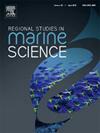No effect of the COVID-19 lockdown on predatory fish abundance in the Caño Island Biological Reserve, Eastern Tropical Pacific Ocean
IF 2.1
4区 环境科学与生态学
Q3 ECOLOGY
引用次数: 0
Abstract
The global COVID-19 lockdown offered a rare opportunity to evaluate human impact on nature. This study used Baited Remote Underwater Video Stations (BRUVS) to assess the effect of the COVID-19 lockdown on predatory fish in the Caño Island Biological Reserve, in the south Pacific of Costa Rica. Despite tourism's potential role in conservation, its impact remains debated due to the environmental degradation and behavioral changes associated with high tourism pressure. Negative binomial regressions revealed no link between the lockdown and fish abundance. PERMANOVA analysis showed no significant variation in the predator community structure due to the lockdown. Finally, Log Response Ratios indicated that less than half (39.4 %) of the predatory fish species varied during the lockdown. We recommend that fine-scale metrics be included in future research to fully understand the impact of tourism on marine species. This study highlights the importance of environmental factors in determining the abundance of predatory fish and provides insight into how marine tourism may be affecting some of the studied species.
COVID-19封锁对东热带太平洋Caño岛屿生物保护区的掠食性鱼类丰度没有影响
全球COVID-19封锁为评估人类对自然的影响提供了难得的机会。本研究使用带饵的远程水下视频站(BRUVS)来评估COVID-19封锁对哥斯达黎加南太平洋Caño岛屿生物保护区食肉鱼类的影响。尽管旅游业在保护中具有潜在的作用,但由于与高旅游压力相关的环境退化和行为变化,其影响仍存在争议。负二项回归显示封锁与鱼类丰度之间没有联系。PERMANOVA分析显示,封禁对捕食者群落结构没有显著影响。最后,对数响应比表明,在封锁期间,不到一半(39.4 %)的掠食性鱼类发生了变化。我们建议在未来的研究中纳入精细尺度的指标,以充分了解旅游业对海洋物种的影响。这项研究强调了环境因素在决定掠食性鱼类数量方面的重要性,并提供了海洋旅游如何影响某些研究物种的见解。
本文章由计算机程序翻译,如有差异,请以英文原文为准。
求助全文
约1分钟内获得全文
求助全文
来源期刊

Regional Studies in Marine Science
Agricultural and Biological Sciences-Ecology, Evolution, Behavior and Systematics
CiteScore
3.90
自引率
4.80%
发文量
336
审稿时长
69 days
期刊介绍:
REGIONAL STUDIES IN MARINE SCIENCE will publish scientifically sound papers on regional aspects of maritime and marine resources in estuaries, coastal zones, continental shelf, the seas and oceans.
 求助内容:
求助内容: 应助结果提醒方式:
应助结果提醒方式:


